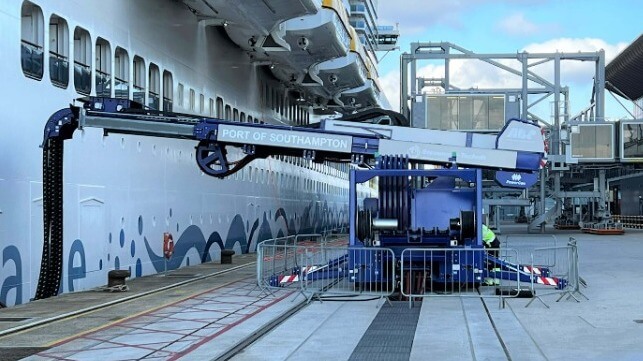UK Chamber of Shipping Calls for Mandatory Shore Power

The UK Chamber of Shipping is calling on the British government to institute mandatory requirements for installing and using shore power at the nation's seaports.
The Chamber has adopted a target of attaining net-zero emissions by 2050, twice the current level of ambition at IMO. It wants to see British shipping accelerate its decarbonization efforts, to include widespread adoption of shore power at UK ports by 2030. By rolling out and requiring the use of shore power, the British government could reduce emissions from shipboard generators and provide the necessary infrastructure for battery-electric vessel charging.
At present, only two ports in Britain - Orkney and Southampton - are equipped for shore power. The U.S., Canada, Germany, Italy, France Norway, Finland, Denmark and Sweden all have more, and China has fully 50 operational shore power facilities.
"The UK is 20 years behind on shore power. Catching up now requires a clear and targeted regulatory framework to drive adoption across our fleets and ports," said UK Chamber CEO Sarah Treseder in a statement. "The government has shown it is prepared to back our industry in developing new solutions for our net zero transition. It must also act fast to back deployment of green solutions like shore power, which are already tried, tested and trusted."
The UK's shipowners report that the absence of shore power infrastructure is the top barrier to rolling out cold-ironing in their fleets. In a survey, 78 percent of UK Chamber of Shipping members said that the lack of the shoreside infrastructure was the number-one obstacle.

that matters most
Get the latest maritime news delivered to your inbox daily.
The Chamber's plan calls for prioritizing sectors with predictable port calls and the highest achievable impact on emissions reductions, particularly for vessel classes that spend long periods alongside the pier. This includes containerships, passenger vessels, tugs and OSVs.
In addition to mandatory shore power targets for ports, the Chamber also called for the government to provide financial support for infrastructure and shipboard equipment, similar to the UK's investments in charging locations for electric cars. It also recommended setting up a fine for ships that do not use available shore power facilities, directing the proceeds to a new fund that would underwrite the cost of more shore power installations.
